A note before we get started: The theological themes of this episode are relevant and hard to dismiss. Thus, even though I am not a particularly religious person, the following recap has quite a bit of Christian religious tone. If that’s not your jam it’s okay to opt out now. Thanks in advance for reading.
Warning- Contains spoilers from Outlander Episode 412: Providence

Behold the Lamb of God who takes away the sin of the world– John 1:29, Agnus Dei
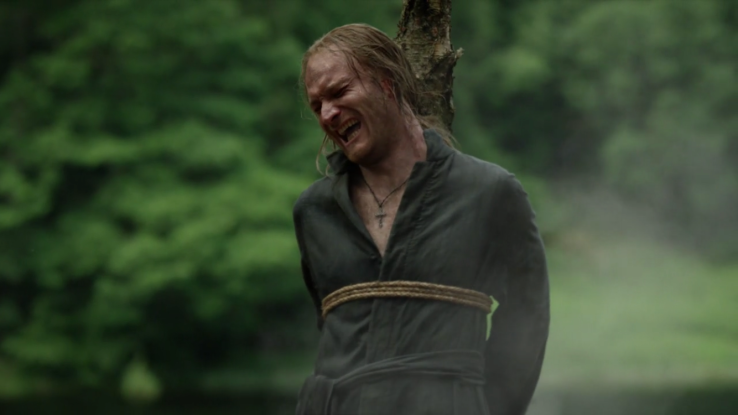
Whew. That was a doozy…I’m not sure my emotions have fully recovered from that one. Bravo to all involved, truly.

It is wholly appropriate that I’m writing this post on a Sunday morning– prominent religious imagery exists throughout this episode. With major themes of confession and forgiveness, a title of “Providence” (defined as the protective care of God), and a main storyline that revolves around a priest, the son of a minister, and the baptism of an infant, this is perhaps the most overtly religious episode of the series to date.

The sermon this morning: our own salvation. More specifically, how absolution is achieved through the salvation of others. This hour we find our characters elevating themselves through forgiveness, rescue, or mercy. God gave mankind free will and everyone in “Providence” struggles with the burden of choice. Ultimately, this episode argues that we can never escape our own inherent nature; good men and women will always elect an honorable path.
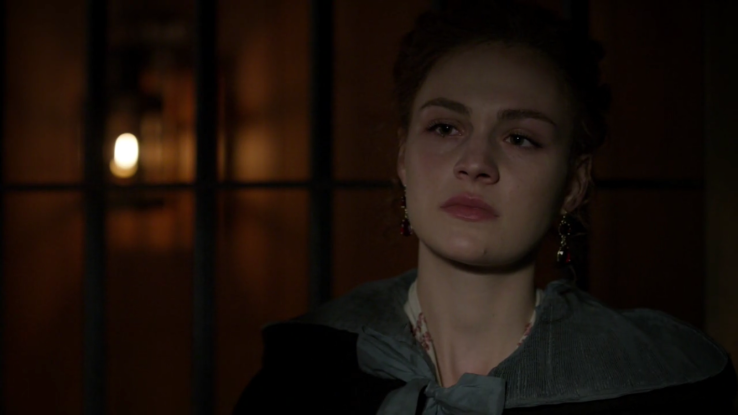
Through letter and voiceover, Jamie implores Brianna to seek peace through forgiveness. Such is the path of the righteous; we shepherd others through their valleys of darkness and, in turn, find absolution.

Such is the path for our characters, also. They guide others through tribulation, reaffirming their faith in love and each other in the process.

This week begins right where we last left Roger, literally running the gauntlet in the Mohawk village of Shadow Lake. He is made captive of the Mohawk and immediately makes a series of cultural faux pas. He manages to befriend Johiehon, a French-speaking Mohawk and mother of a blue-eyed infant. She attempts to ease Roger’s suffering, personally empathizing with his plight.
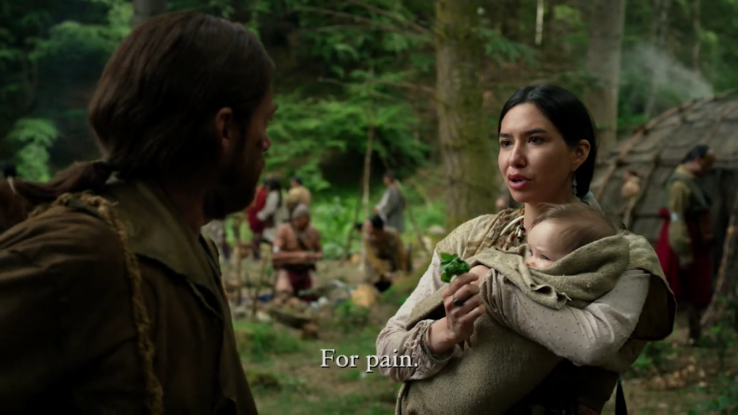
This catches the attention (and likely jealousy) of Kaheroton, and Roger is taken to a prisoner’s hut by order of Tehwahsehwkwe (brilliantly but all-too-briefly played by the wonderful Tom Jackson).

There he finds Père Alexandre Ferigault, a French priest and fellow prisoner. He informs Roger that they are currently in the Province of New York and that the Mohawk have named Roger Yona’kensyonk, meaning “dogface.”

Back at River Run, Lord John tells Brianna that Stephen Bonnet has been captured and is sentenced to hang. She implores Lord John to allow her an audience with Bonnet, arguing that her emotional healing depends on her ability to give her rape closure. She uses Jamie’s letter for sway, and Lord John finally agrees. Immediately we see the theme of the episode employed here; Lord John perhaps finds a sense of peace in being able to help Brianna. Salvation through others.
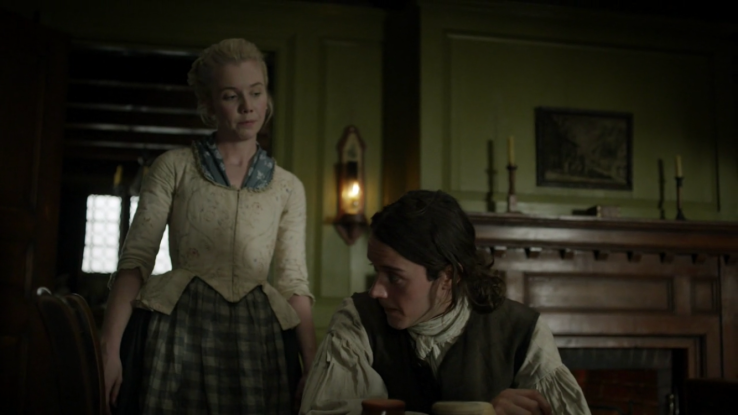
Fergus is doing the same, as he plans to bust Murtagh out of the Wilmington jail. Marsali interrupts his rather cute thimble-and-cup war strategy and proves her ever-increasing awesomeness by being totally supportive. Blow up the jail and act as the getaway? ALL IN. Marsali knows that Murtagh needs rescuing and, more importantly, she knows Fergus is capable and needs to prove his worth. Again, Marsali helping Fergus and Fergus helping Murtagh: salvation via saving others.

With the exception of Jamie’s voiceover, Jamie and Claire are notably not present this episode. But notice how they are invoked by others- Brianna, Lord John, Fergus, and Marsali- as they summon the courage for their actions. I wish they were here, almost as if Jamie and Claire are divine. Everyone is always so dependent upon them being the reliable heroes, but for once it falls to the others to do the saving. Just as we turn to God for guidance, our characters this hour must use lessons and strength learned from Jamie and Claire. In Jamie’s words, freedom is hard-won; grace is something our characters have to achieve for themselves.

Roger and Alexandre give confession to each other while awaiting their unknown fates. Alexandre explains that he has offended the Mohawk by not baptizing his own child with Johiehon; he cannot legitimately baptize the child since he is a sinner. Although Roger implores Alexandre to save himself and give the pretense of baptism, Alexandre cannot be swayed. He would know the truth and, more importantly, so would the Lord.

Roger tries to make the case for “looking out for Number One,” attempting to convince himself that this is the sort of man that he has become. He used to believe in love and virtue but look where it landed him– broken and alone. To say his faith is challenged is an understatement. He feels forsaken in all ways possible.
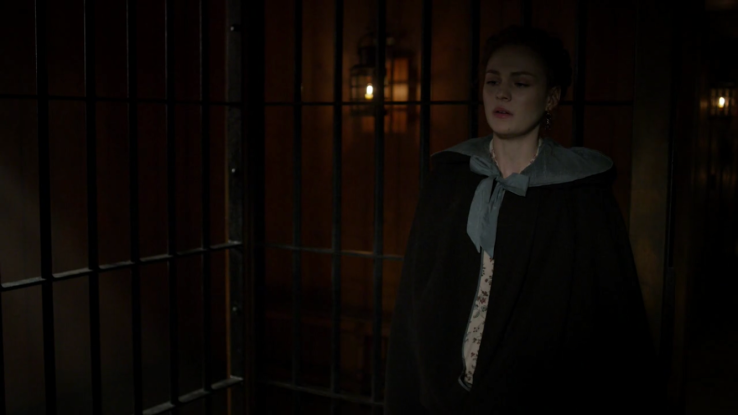
Brianna finally confronts Bonnet, offering him some semblance of peace before his death. Notice how her cloak resembles a religious robe? Brianna provides grace to the condemned man, giving him the gift of immortality through his (possible) child. Her magnanimity provides her path to forgiveness.

Bonnet, for his part, reveals the smallest glimmer of humanity and gives Brianna a ruby for the child’s welfare. It is perhaps an act of purgation before death. Everyone say it with me, now: salvation through others.

While Brianna and Lord John are visiting the jail, Fergus and the Regulators are plotting and enacting Murtagh’s escape. They effectively take control of the prison, conveniently leaving the jailer’s keys within reach of Bonnet before they leave…plot to be continued.

Notice how Murtagh and the Regulators don’t leave the unconscious guard behind? Also notice how Lord John decides not to impede their plans for escape? They all choose to make the right decision in the end– the decisions that sit best upon the consciences. It’s a parallel to the more dramatic decision Roger makes later; even as we try to convince ourselves that we are the type to only look out for “number one,” we can never fully turn away from our true nature.

Boom goes the dynamite! Listen, if I ever find myself in prison, I for sure want Diana Gabaldon’s characters busting me out. Swords, cattle, ocean jumps, explosives…by Season 4 they pretty much have this stuff perfected.
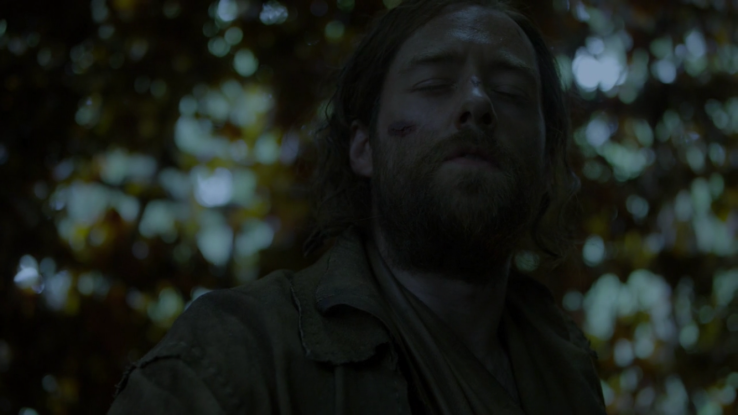
The Mohawk give Alexandre one last chance, cutting off his ear in punishment when he remains steadfast. He refuses to sacrifice his beliefs, knowing that the salvation of his soul means more than the physical salvation of his mortal body. Roger administers a prayer for the sick, attempting to give comfort as he himself wrestles with his beliefs.

Père Ferigault is sentenced to a slow death at the pyre and Roger manages to escape in the confusion. But Roger, in trying to run away, finds that he cannot truly run away from who he is. Because who he is an honorable, fundamentally good man who will always elect the righteous course. Like Alexandre, Roger cannot compromise his integrity. He turns back, symbolically choosing the path back to redemption.

In what likely amounts to a suicide mission, Roger gives mercy to Alexandre as he stokes the flames of the pyre into conflagration. Alexandre is thus spared a slow and torturous death.
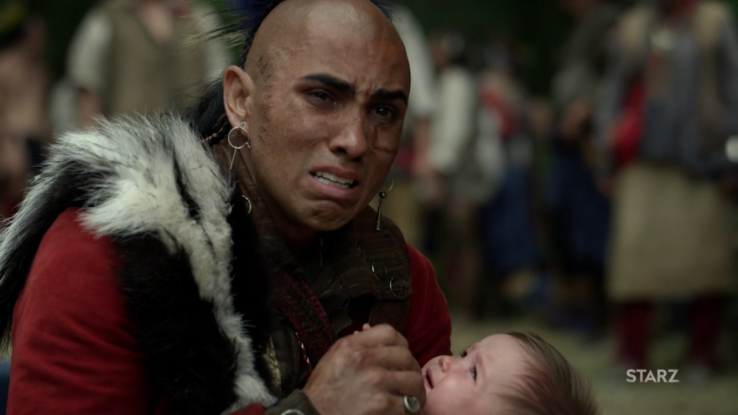
Johiehon, in her grief, throws herself into the fire. Barber’s Adagio for Strings (commonly used for the Agnus Dei), plays hauntingly as a reminder of the sacrifices these characters are making in the name of redemption and love.
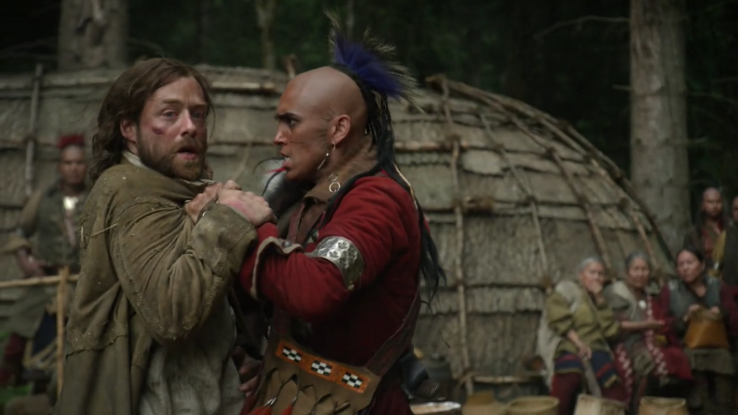
Roger has also undoubtedly sacrificed himself, for there will surely be consequences for his actions. But he is saved. In the end he returns to his faith in love and humanity. All he can ask for now is…providence.
Slàinte.
photos: STARZ


Wow Tracy. That is a powerful piece you have written. I haven’t watched this episode yet but a good friend has given me an overview. Thank you for those breathtaking insights.
LikeLiked by 1 person
Thank you, Pam. I’ll be curious to know your thoughts when you watch it… for me it was one of the best ones this season.
LikeLike
Your review of this episode is very insightful. I did not see the religious theme until reading your review. Excellent writing and observation. Thank you. Much to think about and rewatching the episode.
LikeLiked by 1 person
Thank you for reading 🙂
LikeLike
After every episode, I come to read your blog. And evey time, I am not disappointed. You always find the theme that was hiding like the purloined letter. Thank you so much for your weekly insights.
LikeLiked by 2 people
Thank you so much for reading- I appreciate that 🙂
LikeLike
Wow. For me, this was the most powerful episode of the season. I nearly sobbed during Roger’s spoken prayer for the priest. When reading the books, Jamie’s religious upbringing drives his actions. He sacrifices himself repeatedly (taking a beating for Leoghaire, his regiment during their training for Colloden, & for a fellow prisoner in Ardsmuir. Thank you for tieing all the threads together for this episode. Your deep insight is so appreciated. Ever think of developing an online course for other Outlander fans?
LikeLiked by 2 people
Thank you for reading! I’ve noticed Karen Campbell, the writer of this episode, incorporates quite a bit of religious reference in her episodes- she also wrote “Do Mo Harm.” It’s a nice nod to the book readers, I think; faith is such a large part of the novels.
LikeLiked by 2 people
This was the most emotional episode of the series, I believe. Perhaps it is my beliefs that drove my emotions, but, in these difficult times, the themes of forgiveness, grace, redemption, love above all others struck me to my core. Thank you for your insightful writing as always. BTW, there is a typo in this text–it is Adagio for Strings, not Asiago as I’m sure the auto correct decided.
LikeLiked by 3 people
Ugh, yes! Not Asiago! Although that sounds delicious. Thanks for catching that!
It was a powerful episode. So many of those themes have been prominent throughout the season.
Thank you for reading.
LikeLike
I have only just watched this episode – I felt even more emotionally shocked than the last one! Thank you for drawing the themes in Providence together so well. I have listened to many people who have had terrible traumas in their lives and I can see reflected in the episode how people do attempt to offer grace and forgiveness and also to step in and provide succour even at their own cost. Bless you for your insight.
LikeLike
I didn’t think they could do it, but they did! This was the very best on so many levels…story, acting, pulling on our heart strings..and you, once again, tied it all together for us as I was a jumbled mess of emotions after watching this episode…thank you for reelin it in!!
LikeLiked by 1 person
I’ll be watching the episode again tonight. There was too much going on at my house last night and had to keep pausing it. Definitely reduced the impact, but, even so, WOW! The scenes with Richard Rankin and Yan Tual were amazing. This section of the book was always so uncomfortable for me. Pere Ferigault’s conviction leading him to his demise and then his love following him onto the conflagration. I always wondered if his decision would have been different had he known that she would make that choice. Sera-Lyse McArthur and Braedon Clarke were astoundingly good! I did catch so many of the themes that you referenced, but totally missed how everyone looked to Jamie and Claire, even in their absence, for guidance or support in their actions. This will be an episode I watch several times. Thanks, as always for such a fabulous analysis. What am I gonna’ do during Droughtlander when there is no Outcandour to look forward to on Monday morning!? Thanks again.
LikeLiked by 1 person
I agree that this episode is certainly driven by religious themes. Diana, from what I’ve read about her, is a very religious person, and faith plays an integral part in the series. But I think that how we view the actions of Father Alexandre and Roger depends on our personal perspective. In my opinion, Roger’s sacrifice was very admirable and in keeping with his character. As you point out, “Roger, in trying to run away, finds that he cannot truly run away from who he is. Because who he is an honorable, fundamentally good man who will always elect the righteous course.” Father Alexandre, for me, is a completely different case. He may be faithful to the vows he’s taken as a priest, but he’s also very selfish. We don’t know very much about him except what he tells Roger. But he does not seem at all concerned about the likely repercussions his actions will have on others. Yes, he’s willing to suffer terribly for his faith. But his “sacrifice” results in great harm to others — most notably the woman he loves and, to a lesser degree, Roger. I’m glad this episode is over. Plus, I really miss Jamie and Claire.
LikeLiked by 1 person
Zealots often are unable or unwilling to understand the full impact and harm which their actions influct. They are single minded in their beliefs- which makes them dangerous to those around them – as was the priest in this episode.
LikeLiked by 1 person
Father Perigault’s motive is not selfish at all. He is completely concerned for the soul of his child. He says, “I am damned. I will not damn an innocent child because of the false blessing of a fallen priest.” Believing himself damned, he wants to limit the repercussions of his actions, and not endanger his son.
LikeLike
I knew this episode would be powerful, especially since we actually saw Johienhon joining her love in death. I felt for Kaheroton, who was obviously in love with her. My husband was afraid he was going to throw the baby into the fire with its parents (he hasn’t read the books), but that only crossed my mind momentarily, because of the tender way he was holding her. I hope she will receive the sacrament of baptism next week, in much the same way as it was in the book. Your recap/review, as always, deepened my appreciation with the episode. The only other thing I’ll say is to point out that the reason the unconscious warder was pulled from the jail prior to the explosion was because Brianna insisted they take him out. The character is growing. I’m glad to see it. Thanks for this review.
LikeLiked by 1 person
Great review very thoughtful. You referred to the priest as a Christian yet his stance was hard line Catholic which we haven’t seen in quite a long time. It is hard for our Modern Age to understand an Attitude such as the priest portrayed, even Rodger coming from the 50s, finds it hard so that shows you how much change the church has gone through in the last several hundred years. It is a lesson that many people could use in this day and age because sticking to your guns and your principles is not very admired anymore. I think I need to re-read the Drums of Autumn to better understand this episode
LikeLiked by 1 person
I previously said you wrote a powerful review Tracy and now having seen this episode I realise why… the episode was so powerful. It conveyed so much and brought back the huge part that religion and faith play in all the books, more specifically in Jamie’s life. Superb acting by everyone but especially Richard who portrayed Roger’s anguish so realistically; his pain was palpable. I thought the changes were true to Diana’s books. You mention how everyone did what needed to be done without Jamie and Claire. The reason this was possible is because of the influence they have had on their family and friends. This is where the heart of the story lies… in the love and influence these two have on all those they love and care for. Even though I knew what was to happen in those last couple of scenes I couldn’t help but feel distressed and sorrowful. Kaheroton’s grief was hard to witness. I agree with many others; this is the best episode by far for so many reasons.
LikeLiked by 1 person
Well, I am happy to have discovered your blog (via Diana Gabaldon’s leaving a link to it on her FB page) and see now I must check in regularly as you have written a terrific summation of the episode 412. I am not a religious person, so I found those things connected with religion to be illuminating, since I did not put all those two and two’s together. Thank you.
LikeLiked by 1 person
Movingly expressed as so much of Diana’s stories are about the Christian faith of her characters, something that the show series has chosen not to emphasize. This episode did. Thank you for noticing and for Diana noticing and pointing people to your blog.
Emily
LikeLiked by 1 person
I really love the series and am so sad when each one ends. I read all the books you’ve written and the message is powerful and so uplifting right now in this turmoil we’re in.
LikeLiked by 1 person
Very good take on this masterfully done episode! I enjoy your insight, and appreciate your sharing with us. I discussed this with my sister…She didn’t like that Roger went back, and felt Brianna was almost taunting (I’m sure there’s a better word, but it’s not coming to me now) to Bonnet. She hasn’t yet read the books. I gave her my take…Roger, by his very nature and upbringing, can’t put himself first, he always considers others, hence his continued research for Jamie after Claire left Scotland in ’68, and after Brianna ran from him at Grandfather Mountain. Brianna was trying to find peace by following her father’s advice, and was desperately trying to maintain her personal dignity by appearing aloof. Granted, a big mistake to assume the baby is Bonnet’ s, but in keeping with the overall tone of the episode. I did feel that the priest, in his insistence of paying for his sin by not baptizing his child, and basically consigning himself to martyrdom, exhibited not a small amount of pridefulness underneath his outwardly stoic acceptance of his fate. I kind of agreed with Roger that he was an idiot. Looking forward to your next essay.
LikeLiked by 1 person
The idea that the minister of a sacrament must be in a state of grace for the sacrament to be valid is a heresy known as donatism. This heresy had been refuted long before the Outlander time period, and Fr. Ferigault, as a Jesuit, would have been well aware of it. His rationale for not performing the baptism was a litle more nuanced in the books, but the show oversimplified it. I realize that they were trying to make it easier for viewers to understand but wish they had not promoted a heresy that could have viewers doubting the validity of sacraments they themselves have received. Other than this issue, I though it was a great episode with wonderful performances.
LikeLiked by 1 person
Your comment “Johiehon, in her grief, throws herself into the fire.” upset me because she did not throw herself. I thought it was absolutely imperative for the viewer to see that she slowing and deliberately walked her body up onto the logs on fire and wrapped her body around his. That to me was the most powerful moment of that entire scene. I screamed at Roger not to go back. I was so angry at the Priest, in fact believing that he was arrogant to think that God would want him to make that display when he could be of so much use by being alive. So to see her walk up onto those logs and put her arms around him and wrap her legs around him as if to comfort him through til they died took my breath away.
LikeLiked by 1 person
Excellent observations. One of the reasons I loved Diana’s Outlander books, was her references of how faith played in the lives of Jamie and the other characters. (Jamie’s desire for a priest to wed them, the Mother Superior and how she cared for the ill, baptizing and naming the baby Faith, Jamie’s small alter and his lighting the candle and praying for his family and his son Will, his fear for his own and loved ones’ souls, and on and on). I told my husband, (after he got hooked on the show), to notice how close Jamie remained strong in his faith throughout the stories. We both thought episode 412 was exceptional and I’m glad the show’s writers could see the importance of how faith has played in Diana’s books and have included it in the series. It would have been too easy to ignore the religious references, but then, it would no longer be Diana’s story.
LikeLiked by 2 people
This is one of the things I have loved about the entire Outlander series since I first read Outlander 27 years ago. The 18th century characters act in keeping with their 18th century beliefs. Just because this woman from the 20th century has dropped into their midst, they don’t magically adopt modern ideas. In Book 1, Claire tells Jamie that he doesn’t have to marry her to sleep with her, and Jamie replies (paraphrasing), “What kind of man do you think I am?” In Drums of Autumn, Jamie is scandalized that his daughter is about to have a child out of wedlock. He’ll see her married if he can. Claire’s is the modern perspective and it’s easy for modern readers to identify with her point of view. But having these different points of view adds to the conflict and ultimately our enjoyment of the books.
LikeLiked by 1 person
Picking a nit here: The efficacy of the sacrament is not dependent on the state of grace of a validly-ordained priest. If it were, no priest could ever perform a sacrament because priests. like every one of us, are sinners.
The grace of the sacrament comes through the hands/actions of the priest or bishop, but the Grace itself comes from God, using these clergy as the means of delivery of the sacraments.
The priest’s choice here is (in my opinion) based on a false premise, but I still liked the episode very much.
LikeLiked by 1 person
Theological nitpick:
The grace of the sacrament doesn’t depend on the state of grace of a validly-ordained priest. The Grace of sacraments comes from God, through the agency of His priests and bishops and deacons.
If the state of grace of the clergy affected the sacrament, they’d never be able to perform the sacraments because priests (etc.) are all sinners, just like every one of us.
LikeLiked by 1 person
No the state of grace of the parents is the issue in this case, I think… don’t parents and God parents need to be in a state of grace, meaning having to have gone to confession and get absolution prior to having a child christened or baptized as a baby since they will be helping to lead the child in their spiritual lives. Thus his reason for refusal is he as the child’s parent not being in a state of grace he couldnt baptize the baby because he couldn’t stop loving the girl or his child which would keep him from being in a state of grace. This is how I remember the Father explain his reasonings in the book.
LikeLiked by 1 person
As juliethelibrarian noted, the reason Fr. Ferigault refused to perform the baptism was more nuanced in the book than on the show. Fr. Ferigault’s not being in a state of grace was not a barrier for him to perform baptisms per se — he just could not baptize ANY child whose PARENTS were not in a state of grace.
“I had always…refused to baptize infants unless both parents were Christian and in a state of grace. This is necessary…if the child is to be raised in faith…And of course I could not baptize this child…not because of its mother” [who had converted to Christianity]—”but because its father is not in a state of grace” [for having fallen in love].
LikeLiked by 1 person
Well Done!!!
LikeLiked by 1 person
Sorry, I basically posted twice with the same general comment.
LikeLiked by 1 person
I know it doesn’t make for good drama if Father Ferigault chooses to baptize the child and thus save his own life. Still, it was his choice, or more aptly Ms. Gabaldon’s as the writer. I just think Catholics and non-Catholics alike should be made aware that the Church would not have condoned his choice to be burned at the stake because of the perception of his unforgivable moral failing of fornication with Johiehon. He was not damned, as he said, because forgiveness is always possible with God. Ideally, one would hope that the priest who administers any of the sacraments is in the state of grace. However, the efficacy of the administration of a sacrament (in this case baptism) does not depend on the holiness of the priest. This article of Catholic faith was advanced by both St. Augustine and St. Thomas Aquinas and affirmed by the Council of Trent. So, in reality, the choice of Father Ferigault to be burned at the stake for refusing to baptize his child goes against Church teaching regarding administration of the sacraments. As an ordained priest, he should have been well aware of this doctrine. Additionally, the Catechism of the Church states that from the moment a sacrament is celebrated in accordance with the intention of the Church, the power of Christ and his spirit acts in and through it, independently of the personal holiness of the priest. The Church has been guilty of myriad abuses throughout history, often because of the corruption of fallible men in positions of power, most notably the excesses of the Inquisition when alleged heretics were frequently tortured and burned at the stake. The men who did this were corrupt; the doctrines were not.
LikeLike
Many thanks all for thought provoking words.
LikeLiked by 1 person
Thanks for reading!
LikeLike
[…] guides Roger’s thoughts and his actions are usually rooted in some good or moral intent. Providence” (Episode 412) explores that theme deeply; it was the closest we came this season to seeing the […]
LikeLike
Nice blog tthanks for posting
LikeLike